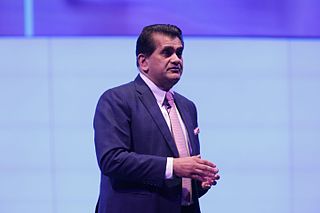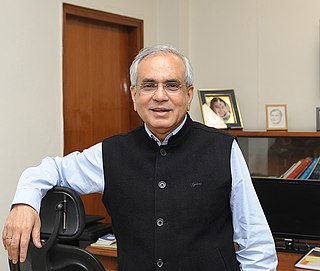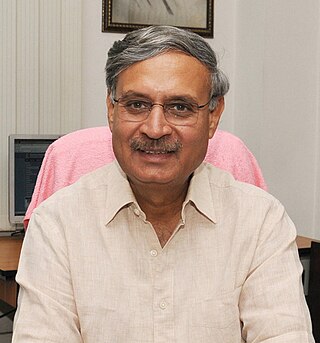The Planning Commission was an institution in the Government of India which formulated India's Five-Year Plans, among other functions.

The All India Council for Technical Education (AICTE) is a statutory body, and a national-level council for technical education, under the Department of Higher Education. Established in November 1945 first as an advisory body, which was given statutory status by an Act of Parliament in 1987, the AICTE is responsible for proper planning and coordinated development of the technical education and management education system in India.

Bibek Debroy is an Indian economist, serving as the chairman of the Economic Advisory Council to the Prime Minister of India. He is also the Chairman of the Finance Ministry's 'Expert Committee for Infrastructure Classification and Financing Framework for Amrit Kaal'. Debroy has made significant contributions to game theory, economic theory, income and social inequalities, poverty, law reforms, railway reforms and Indology among others. Bibek Debroy's recent co-authored magnum opus, Inked in India, stands distinguished as the premier comprehensive documentation, capturing the entirety of recognized fountain pen, nib, and ink manufacturers in India.

The National Development Council (NDC) or Rashtriya Vikas Parishad is the apex body for decision creating and deliberations on development matters in India, presided over by the Prime Minister. It was set up on 6 August 1952 to strengthen and mobilize the effort and resources of the nation in support of the Five Year Plans made by Planning Commission, to promote common economic policies in all vital spheres, and to ensure the balanced and rapid development of all parts of the country. The Council comprises the Prime Minister, the Union Cabinet Ministers, Chief Ministers of all States or their substitutes, representatives of the Union Territories and the members of the NITI Aayog.
Dinesh Arora is an officer of the Indian Administrative Service, 2002 Kerala cadre, presently pursuing his doctoral studies in public health at Johns Hopkins University. He is former Deputy Chief Executive Officer of the Prime Minister Narendra Modi’s flagship healthcare programme, Ayushman Bharat Yojana, in the Ministry of Health and Family Welfare. Prior to this, he was the Director at NITI Aayog. He was the Founder Mission Director of National Rural Health Mission, Kerala, Founder Managing Director of Kerala Medical Service Corporation Limited (KMSCL), and the first Food Safety Commissioner in the State of Kerala. Arira was also worked as an executive director, Rural Electrification Corporation (REC) and CEO RECPDCL, Ministry of Power, Government of India. Arora is proficient in English, Hindi, Malayalam, Punjabi, and Tamil.

Digital India is a campaign launched by the Government of India to make its services available to citizens electronically via improved online infrastructure and by increasing Internet connectivity. The initiative includes plans to connect rural areas with high-speed internet networks. It consists of three core components: the development of secure and stable digital infrastructure, delivering government services digitally, and universal digital literacy.

The NITI Aayog serves as the apex public policy think tank of the Government of India, and the nodal agency tasked with catalyzing economic development, and fostering cooperative federalism and moving away from bargaining federalism through the involvement of State Governments of India in the economic policy-making process using a bottom-up approach. Its initiatives include "15-year road map", "7-year vision, strategy, and action plan", AMRUT, Digital India, Atal Innovation Mission, Medical Education Reform, agriculture reforms, Indices Measuring States’ Performance in Health, Education and Water Management, Sub-Group of Chief Ministers on Rationalization of Centrally Sponsored Schemes, Sub-Group of Chief Ministers on Swachh Bharat Abhiyan, Sub-Group of Chief Ministers on Skill Development, Task Forces on Agriculture and up of Poverty, and Transforming India Lecture Series.

Purvanchal Expressway is a 340.8 km long, 6-lane wide access-controlled expressway in the state of Uttar Pradesh, India. The expressway connects Chand Saray village near Gosainganj in Lucknow district with Haydaria village on NH-31 in Ghazipur district. It is developed by the Uttar Pradesh Expressways Industrial Development Authority (UPEIDA). The Purvanchal Expressway has a 3.2 km long airstrip at Akhalkiri Karwat village near Kurebhar in Sultanpur district for emergency landing of aircraft. The construction work was started by the UPEIDA on 10 October 2018 and was inaugurated and opened to the public on 16 November 2021.

Amitabh Kant is presently India's G20 Sherpa. He is an Indian bureaucrat and the former chief executive officer of NITI Aayog, a public policy think tank of the Government of India. He is a retired member of the 1980 Indian Administrative Service (IAS) batch, the central civil service of the Government of India.

First Pinarayi Vijayan ministry is the Council of Ministers headed by Pinarayi Vijayan that was formed after the Left Democratic Front (LDF) won the 2016 Kerala Legislative Assembly elections. The Council assumed office on 25 May 2016. The ministry had a total of 19 ministers in the Cabinet at the time of swearing-in compared to 21 ministers in the previous government. Pinarayi Vijayan sworn in as 22nd Chief Minister of Kerala, 12th person to hold this position. Chief Minister Pinarayi Vijayan on 3 May 2021 submitted the resignation of the Council of Ministers headed by him to Governor Arif Mohammed Khan after winning a historic victory in the 15th legislative assembly elections by winning 99 of the 140 seats in the Assembly.

Pradhan Mantri Bharatiya Janaushadhi Pariyojana (PMBJP) is a campaign–public welfare scheme of Government of India. It was launched by the Department of Pharmaceuticals to provide quality medicines at affordable prices to the masses through special kendras known as Pradhan Mantri Bharatiya Janaushadhi Pariyojana Kendra (PMBJK).

Rajiv Kumar is an Indian economist who had served as the second vice-chairman of the NITI Aayog. He also serves as the chancellor of Gokhale Institute of Politics and Economics, Pune. His earlier stint in government was initially with the Ministry of Industry and subsequently in the Ministry of Finance, as economic advisor during the reform years of 1991-1994. He has wide experience of having worked in government, academia, industry associations, as well as in international financial institutions. He also served as an independent director on the central boards of the Reserve Bank of India and the State Bank of India.
The Repealing and Amending Act, 2017 is an Act of the Parliament of India that repealed 104 Acts, and also partially repealed three sections of the Taxation Laws (Amendment) Act, 2007, and made minor amendments to three other Acts to correct typographical errors. The Act was the fourth such repealing act tabled by the Narendra Modi administration aimed at repealing obsolete laws.
The Repealing and Amending (Second) Act, 2017 is an Act of the Parliament of India that repealed 131 Acts, and also repealed nine Ordinances promulgated by the Governor-General of India before independence. It also made minor amendments to The Plantations Labour Act, 1951, The Juvenile Justice Act, 2015, and The Rights of Persons with Disabilities Act, 2016. The Act was the fifth such repealing act tabled by the Narendra Modi administration aimed at repealing obsolete laws.

Ministry of Planning is a ministry in India. The minister responsible is the Hon'ble Prime Minister of India. The ministry's institutional capacity is exercised through the central agency: NITI Aayog.
Atmanirbhar Bharat, which translates to 'self-reliant India', is a phrase the Prime Minister of India Narendra Modi and his government used and popularised in relation to the country's economic development plans. The phrase is an umbrella concept for the Modi government's plans for India to play a larger role in the world economy, and for it to become more efficient, competitive and resilient.
B.V.R Subramaniyam is a retired 1988-batch Chhattisgarh cadre Indian Administrative Service (IAS) officer. He has been Secretary in the Ministry of Commerce & Industry, Chief Secretary-Jammu & Kashmir, Principal Secretary-Government of Chhattisgarh, and has held positions in the Prime Minister’s Office. He has previously served in the Prime Minister’s Office (PMO) under both Manmohan Singh and Narendra Modi. He has been instrumental in containing insurgency in Chhattisgarh in the 2010s. In February 2023, he has taken charge as 4th CEO of NITI Aayog.

Parameswaran Iyer is an Indian civil servant and the former CEO of NITI Aayog. He is currently serving as India's nominee as an Executive director in World Bank.
Uma Shankar Pandey is an Indian social worker who is known for his work and contributions to groundwater conservation. He launched the 'Khet mein Med, Med Par Ped ' campaign in 2005, to conserve water by constructing bunds in the fields. He was awarded the Padma Shri by the Indian government in 2023 for his contributions to social work.











